This summer, eight undergraduate students were selected for the 2022 class of Florida Sea Grant’s inaugural Undergraduate Research Internship Program.
The intent of the internship program is to diversify the STEM workforce by introducing undergraduates to research and future careers in science, with a priority for students who have yet to participate in a paid research experience. The program allows Florida Sea Grant affiliated faculty to recruit UF and non-UF students interested in coastal and marine sciences. Students work part time within labs or facilities supporting ongoing research that addresses issues affecting Florida’s coastal resources. In some cases, interns have the opportunity to conduct a new research project.
Projects that FSG research interns support fall under the scope of FSG’s four national focus areas: healthy coastal environments, sustainable fisheries and aquaculture, resilient communities and economies, and environmental literacy and workforce development.
The members of the 2022 Summer Class of Florida Sea Grant research interns and their placements are:
- Max Taylor, Behringer Lab with faculty advisor Dr. Don Behringer
- Kalie Januszkiewicz, Meyer Microbes Microbial Ecology Lab with faculty advisor Dr. Julie Meyer
- Gabrielle Foursa, Tropical Research and Education Center with faculty advisor Dr. Ashley Smyth
- Andrew Foley, Murie Marine Fisheries Ecology Lab with faculty advisor Dr. Deb Murie
- Asher Mann-Romey, Baker Lab with faculty advisor Dr. Shirley Baker
- Kaityln Doyscher, Murie Marine Fisheries Ecology Lab with faculty advisor Dr. Deb Murie
- Chloe Spengler, Coastal Ecology Lab with advisor Dr. Laura Reynolds
- Courtney Aminirad, Food Virology Lab with advisor Dr. Naim Montazeri
Read on to learn more about each intern and their work.
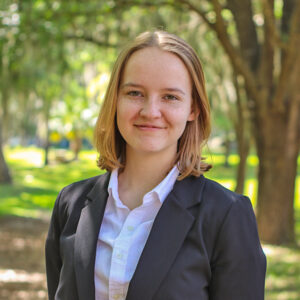 Max Taylor, from the University of Florida, is assisting research on emerging zoonotic diseases, specifically acting as a lab technician to a UF Ph.D. student investigating a microsporidian disease outbreak in Wisconsin’s crayfish. Taylor is also conducting her own research linking crayfish behavior, disease ecology and water column metabolism. Better understanding the fungal disease outbreak in Wisconsin’s crayfish will help manage Florida’s emerging diseases. “Many crustaceans, including blue crabs, stone crabs, and crayfish, are affected by countless pathogens that we are just beginning to understand. This study has not only long-reaching ecosystem impacts, but economic impacts as well through Florida’s fisheries,” says Taylor, whose work takes place out of Trout Lake Station, a limnology-focused research station based in the north woods of Wisconsin and run by a collaborator of Dr. Behringer’s at the University of Wisconsin-Madison.
Max Taylor, from the University of Florida, is assisting research on emerging zoonotic diseases, specifically acting as a lab technician to a UF Ph.D. student investigating a microsporidian disease outbreak in Wisconsin’s crayfish. Taylor is also conducting her own research linking crayfish behavior, disease ecology and water column metabolism. Better understanding the fungal disease outbreak in Wisconsin’s crayfish will help manage Florida’s emerging diseases. “Many crustaceans, including blue crabs, stone crabs, and crayfish, are affected by countless pathogens that we are just beginning to understand. This study has not only long-reaching ecosystem impacts, but economic impacts as well through Florida’s fisheries,” says Taylor, whose work takes place out of Trout Lake Station, a limnology-focused research station based in the north woods of Wisconsin and run by a collaborator of Dr. Behringer’s at the University of Wisconsin-Madison. 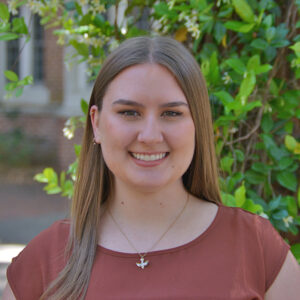 Kalie Januszkiewicz, from the University of Florida, is assisting research on the development of coral probiotic treatments for stony coral tissue loss disease (SCTLD). At Dr. Julie Meyer’s lab in Gainesville, Januszkiewicz has combined her interests of microbiology and marine science learning skills such as performing DNA extractions, bacterial culturing, and epifluorescence microscopy. “SCTLD has spread rapidly through Florida and the Caribbean and has caused massive coral die-offs. Probiotic treatments for SCTLD have shown to be effective in stopping and reversing the disease and may even help to slow its spread,” says Januszkiewicz.
Kalie Januszkiewicz, from the University of Florida, is assisting research on the development of coral probiotic treatments for stony coral tissue loss disease (SCTLD). At Dr. Julie Meyer’s lab in Gainesville, Januszkiewicz has combined her interests of microbiology and marine science learning skills such as performing DNA extractions, bacterial culturing, and epifluorescence microscopy. “SCTLD has spread rapidly through Florida and the Caribbean and has caused massive coral die-offs. Probiotic treatments for SCTLD have shown to be effective in stopping and reversing the disease and may even help to slow its spread,” says Januszkiewicz.
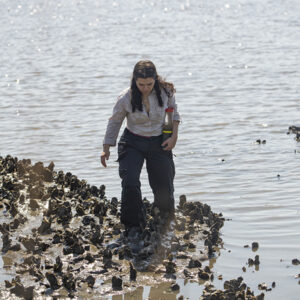 Gabrielle Foursa, from the University of Florida, is working under advisor Ashley Smyth at Tropical Research and Education Center (TREC). Her interests are in sustainable aquaculture, with a special interest in shellfish, seaweed, and marine worms – and their potential to restore habitat and water quality whilst being cultivated as a product. Foursa and Smyth will be spearheading a project with The Nature Conservancy and Sea Grant to establish a partnership with oyster growers in Florida that creates an incentive program for oyster farmers to be compensated for restoring water quality and removing excess nitrogen with their stock. Foursa hopes to learn how oyster farmers operate in Florida; their personal hurdles in the business; how Florida policy influences aquaculture management; and sampling/analysis techniques. “It seems like a really promising approach to an undeniably critical issue. Water quality is the basis for life and commerce in Florida,” says Foursa.
Gabrielle Foursa, from the University of Florida, is working under advisor Ashley Smyth at Tropical Research and Education Center (TREC). Her interests are in sustainable aquaculture, with a special interest in shellfish, seaweed, and marine worms – and their potential to restore habitat and water quality whilst being cultivated as a product. Foursa and Smyth will be spearheading a project with The Nature Conservancy and Sea Grant to establish a partnership with oyster growers in Florida that creates an incentive program for oyster farmers to be compensated for restoring water quality and removing excess nitrogen with their stock. Foursa hopes to learn how oyster farmers operate in Florida; their personal hurdles in the business; how Florida policy influences aquaculture management; and sampling/analysis techniques. “It seems like a really promising approach to an undeniably critical issue. Water quality is the basis for life and commerce in Florida,” says Foursa.
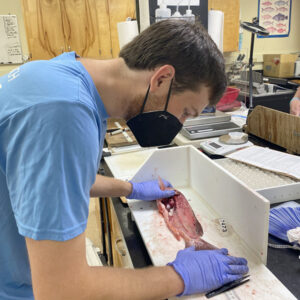 Andrew Foley, from the University of Florida, is working under advisor Deb Murie, at her Marine Fisheries Ecology Laboratory. Foley’s primary interests are in Florida’s Red Drum and Smalltooth Sawfish, with hopes of becoming a fisheries biologist in the future. Foley is working on a study focused on gray snapper, investigating reproduction, age and growth with the purpose of being used in a stock assessment. This study will allow Foley and Murie to gain a greater understanding of how the population of gray snapper is being managed while also allowing them to see if the fish migrate from nearshore to offshore waters every time they spawn in aggregations.
Andrew Foley, from the University of Florida, is working under advisor Deb Murie, at her Marine Fisheries Ecology Laboratory. Foley’s primary interests are in Florida’s Red Drum and Smalltooth Sawfish, with hopes of becoming a fisheries biologist in the future. Foley is working on a study focused on gray snapper, investigating reproduction, age and growth with the purpose of being used in a stock assessment. This study will allow Foley and Murie to gain a greater understanding of how the population of gray snapper is being managed while also allowing them to see if the fish migrate from nearshore to offshore waters every time they spawn in aggregations. 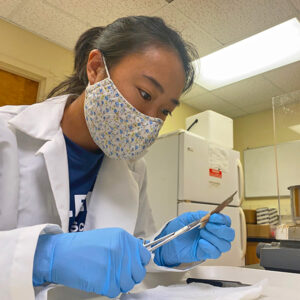 Kaitlyn Doyscher, from the University of Florida, is working at the Murie Marine Fisheries Ecology Lab with faculty advisor Deb Murie. Doyscher is assisting Dr. Murie’s research tagging gray snapper during their spawning aggregations offshore in the Gulf of Mexico to determine their geographical source. Additionally, Doyscher and Murie are collecting otoliths (ear stones), fin spines and rays to determine the age of their samples and collecting gonads to determine the duration and peak of their spawning season. “By determining the gray snapper spawning season, fishing regulations could be adjusted to protect the spawning aggregations of gray snapper. Size regulations may be adjusted depending on what age or size a gray snapper reaches sexual maturity to reduce fishing mortality on juvenile gray snapper,” says Doyscher.
Kaitlyn Doyscher, from the University of Florida, is working at the Murie Marine Fisheries Ecology Lab with faculty advisor Deb Murie. Doyscher is assisting Dr. Murie’s research tagging gray snapper during their spawning aggregations offshore in the Gulf of Mexico to determine their geographical source. Additionally, Doyscher and Murie are collecting otoliths (ear stones), fin spines and rays to determine the age of their samples and collecting gonads to determine the duration and peak of their spawning season. “By determining the gray snapper spawning season, fishing regulations could be adjusted to protect the spawning aggregations of gray snapper. Size regulations may be adjusted depending on what age or size a gray snapper reaches sexual maturity to reduce fishing mortality on juvenile gray snapper,” says Doyscher.
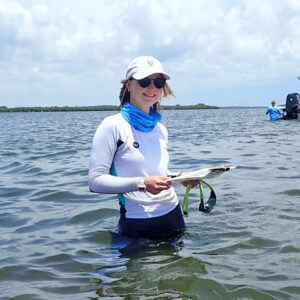 Chloe Spengler, from the University of Florida, will be working at the Coastal Ecology Lab under advisor Laura Reynolds. Spengler is currently working with seagrass ecosystems and conducting a seagrass decomposition field experiment. Spengler and Reynolds have collected two different species of seagrass (and one species of macroalgae) from four sites along a phosphorus gradient on the Gulf Coast, which they will then put in bags and bury off Cedar Key. Their research will measure the amount of decomposition by comparing the before and after biomass, and then compare the amount of decomposition between the different species and treatments. Spengler believes her research could demonstrate how phosphorus impacts seagrass decomposition rates. “Seagrass beds are one of the biggest blue carbon systems, meaning that they store a lot of the ocean’s carbon through decomposition. Carbon storage is important for mitigating climate change. I’m looking to see how nutrient levels affect this carbon storage.” This is Spengler’s first time working with blue carbon.
Chloe Spengler, from the University of Florida, will be working at the Coastal Ecology Lab under advisor Laura Reynolds. Spengler is currently working with seagrass ecosystems and conducting a seagrass decomposition field experiment. Spengler and Reynolds have collected two different species of seagrass (and one species of macroalgae) from four sites along a phosphorus gradient on the Gulf Coast, which they will then put in bags and bury off Cedar Key. Their research will measure the amount of decomposition by comparing the before and after biomass, and then compare the amount of decomposition between the different species and treatments. Spengler believes her research could demonstrate how phosphorus impacts seagrass decomposition rates. “Seagrass beds are one of the biggest blue carbon systems, meaning that they store a lot of the ocean’s carbon through decomposition. Carbon storage is important for mitigating climate change. I’m looking to see how nutrient levels affect this carbon storage.” This is Spengler’s first time working with blue carbon.
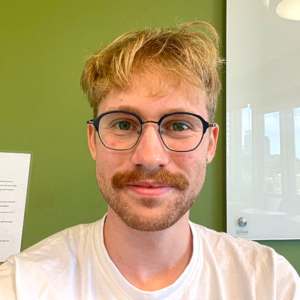 Asher Mann-Romey, from Stonybrook University, is working at the Baker Lab under Dr. Shirley Baker. The pairs research focused on how copper sulfate affects the filtering rates of mussels and oysters. “The research I worked on with Dr. Baker was very important to me because Florida’s estuaries and bays were very important to me in my childhood, and the bivalves that maintain these precious waterways are vital to Florida’s health.” The most exciting component of Mann-Romey’s work is being able to work in a lab, see how things are run, and even complete experiments on his own.
Asher Mann-Romey, from Stonybrook University, is working at the Baker Lab under Dr. Shirley Baker. The pairs research focused on how copper sulfate affects the filtering rates of mussels and oysters. “The research I worked on with Dr. Baker was very important to me because Florida’s estuaries and bays were very important to me in my childhood, and the bivalves that maintain these precious waterways are vital to Florida’s health.” The most exciting component of Mann-Romey’s work is being able to work in a lab, see how things are run, and even complete experiments on his own.
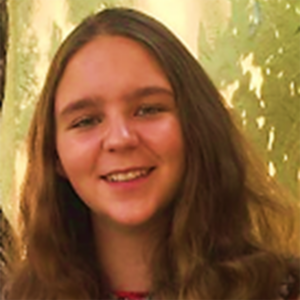 Courtney Aminirad, from the University of Florida, is working under advisor Dr. Naim Montazeri’s at the Food Virology Lab. Aminirad is contributing to ongoing research characterizing bacteriophages (viruses that prey on bacteria) isolated from oysters harvested from Florida’s Gulf Coast waters. Her research has been focused on evaluating the stability of the bacteriophages across different environmental conditions and assessing their effectiveness in killing the pathogen. “Our experiments serve as proof-of-concept that the bacteriophages we are studying can control the population of this pathogenic Vibrio parahaemolytiocus in raw/undercooked seafood products. This provides an alternative biocontrol method to use of antimicrobials, the necessity of which is highlighted by growing antimicrobial resistance and the current limitations on the use of these compounds in food production,” says Aminirad.
Courtney Aminirad, from the University of Florida, is working under advisor Dr. Naim Montazeri’s at the Food Virology Lab. Aminirad is contributing to ongoing research characterizing bacteriophages (viruses that prey on bacteria) isolated from oysters harvested from Florida’s Gulf Coast waters. Her research has been focused on evaluating the stability of the bacteriophages across different environmental conditions and assessing their effectiveness in killing the pathogen. “Our experiments serve as proof-of-concept that the bacteriophages we are studying can control the population of this pathogenic Vibrio parahaemolytiocus in raw/undercooked seafood products. This provides an alternative biocontrol method to use of antimicrobials, the necessity of which is highlighted by growing antimicrobial resistance and the current limitations on the use of these compounds in food production,” says Aminirad.